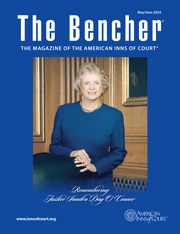Delaware Court of Chancery Explains Distinction between Duty of Confidentiality Under Rule 1.6 and Evidentiary Protection of the Attorney-Client Privilege
The Bencher—May/June 2024
By Francis G.X. Pileggi, Esquire

 A recent Delaware Court of Chancery decision applied New Jersey law to explain the distinctions between a lawyer’s duty of confidentiality under Rule of Professional Conduct 1.6 as compared to evidentiary protections such as the attorney-client privilege and work product doctrine.
A recent Delaware Court of Chancery decision applied New Jersey law to explain the distinctions between a lawyer’s duty of confidentiality under Rule of Professional Conduct 1.6 as compared to evidentiary protections such as the attorney-client privilege and work product doctrine.
In the context of ruling on a motion to compel in the matter of In re Harris FRC Corporation Merger and Appraisal Litigation, (Del. Ch., Feb. 19, 2024), the court provided a public service to lawyers and litigants by conducting a deep dive into the public policy and doctrinal foundations of the two different concepts. The court held that the defendants, who were also lawyers, were required to produce relevant documents for in-camera review.
The court did a survey of case law and rules around the country to buttress its reasoning that courts have consistently held that Rule 1.6 imposes a general obligation of confidentiality that does not inhibit discovery in litigation. Rather, the attorney-client privilege, as well as the work product doctrine, may provide grounds for a client and its counsel to resist producing information in discovery, but the ethical duty of confidentiality does not.
The court also emphasized that Rule of Evidence 510(f) provides that the submission of documents in this context does not waive any privilege. The same reasoning applies when a special magistrate is appointed, as was done in this case, to review on behalf of the court the information that was required to be produced.
Factual Context
The factual context of this motion to compel involved a battle for control and claims for breach of fiduciary duty by minority stockholders against the controlling stockholder, as well as directors and officers in a closely held business. The lawyer-defendants provided extensive services to the company. One served as general counsel in addition to maintaining a separate law practice. The other had a lucrative agreement to provide management services to the company. They incorrectly argued that they were not required to produce any documents or information about any work they did for any clients other than the company.
The relevance of the other work they did for other clients related to the claims that they were using company resources, including company offices, for non-company work, and the plaintiffs were entitled to information about the proportion of their time that was spent on company work as compared to work they did for clients or others besides the company, especially in light of large sums they were paid.
They insisted, as parties to the case, on self-collection and self-review of their documents. They refused to allow anyone else to participate in collection or review and would not produce privilege logs. Generally, in Delaware, the courts frown on self-collection and self-review by a party alone, as compared to a party’s counsel closely overseeing the process for quality control.
General Principles and Takeaways
The Court of Chancery quoted a New Jersey Supreme Court opinion that explained the general prohibition under the ethical rules against disclosure of client information without the client’s consent—unless one of the several exceptions to the rule is available.
The Court of Chancery cited to opinions around the country that recognize as an exception to Rule 1.6 the obligation to participate in discovery where the law requires disclosure.
The highest court in Maryland was also quoted for its clarification of the critical distinction between confidentiality required by ethical rules and the evidentiary basis of the attorney-client privilege. Generally, unless protected by the attorney-client privilege, or a similar doctrine, relevant evidence sought through discovery must be produced.
A key takeaway from the Chancery decision is that “When a party seeks discovery from a lawyer in litigation, the ethical duty of confidentiality does not override the legal requirement to produce evidence.”
The Court of Chancery found that the plaintiffs were entitled to know the number of clients the lawyers represented, other than the company, and the communications with those clients, even though they were not required to reveal any privileged information.
The court recited its inherent authority and the authority granted by rules of court and statutes that allow it to appoint a neutral person on behalf of the court with broad powers that would include reviewing documents in camera and to have that neutral person prepare a privilege log for any privileged documents that were produced in camera.
Interestingly, the court provided a very detailed description of the electronic format in which the lawyers were required to produce the documents to the court-appointed magistrate, “along with a load file” containing at least 15 itemized metadata fields, such as a file name for non-email electronic documents, bates number, title, date created, and related details for each electronic document.
Useful Reference
This decision is a useful reference source when discovery issues arise in connection with lawyers who are either parties or who are closely involved in the business of the parties such that the boundaries of what discovery is available from lawyers is disputed.
Francis G.X. Pileggi, Esquire, is the managing partner of the Delaware office of Lewis Brisbois Bisgaard & Smith, LLP. His email address is Francis.Pileggi@LewisBrisbois.com. He comments on key corporate and commercial decisions and legal ethics topics at www.DelawareLitigation.com.